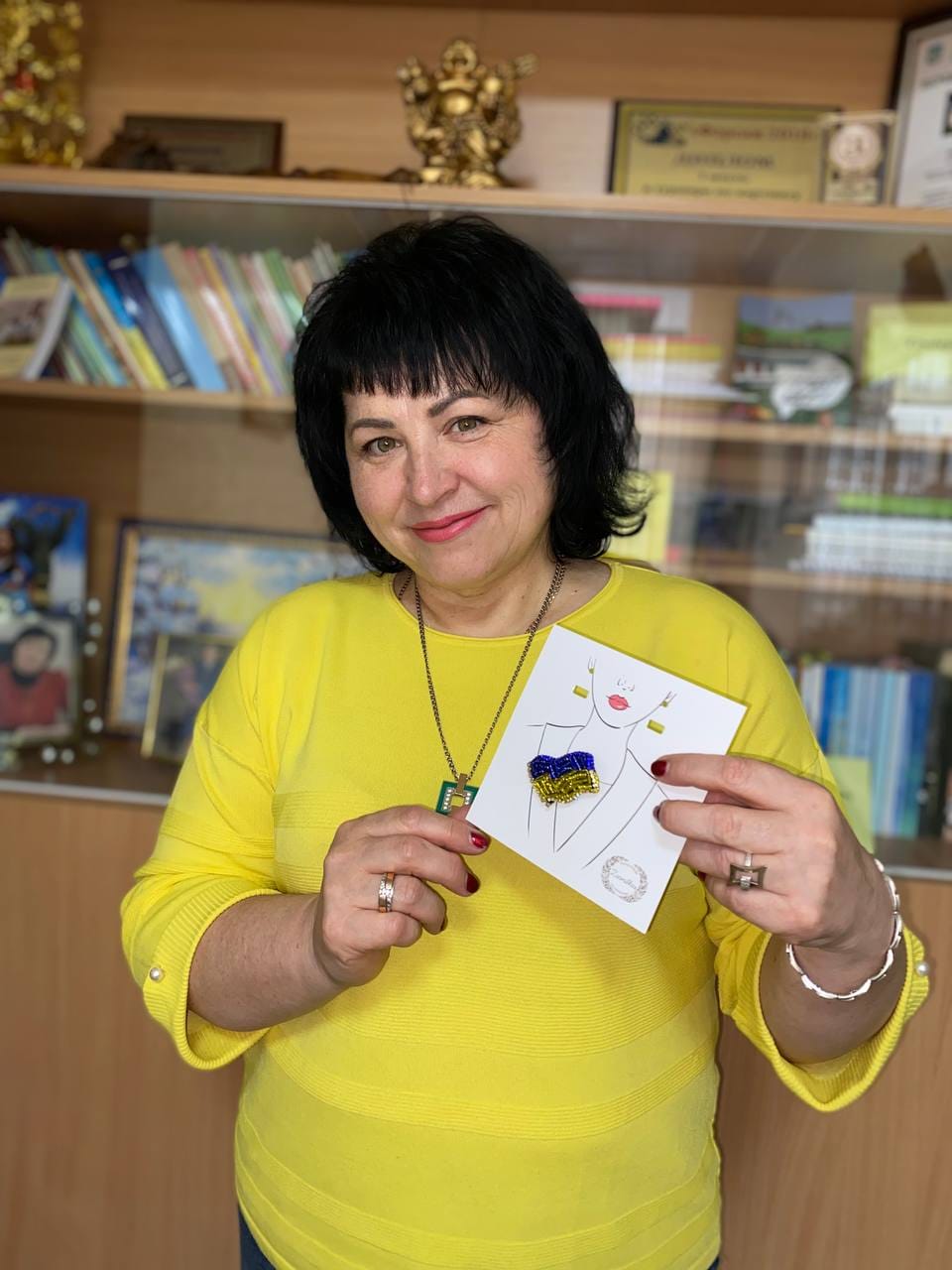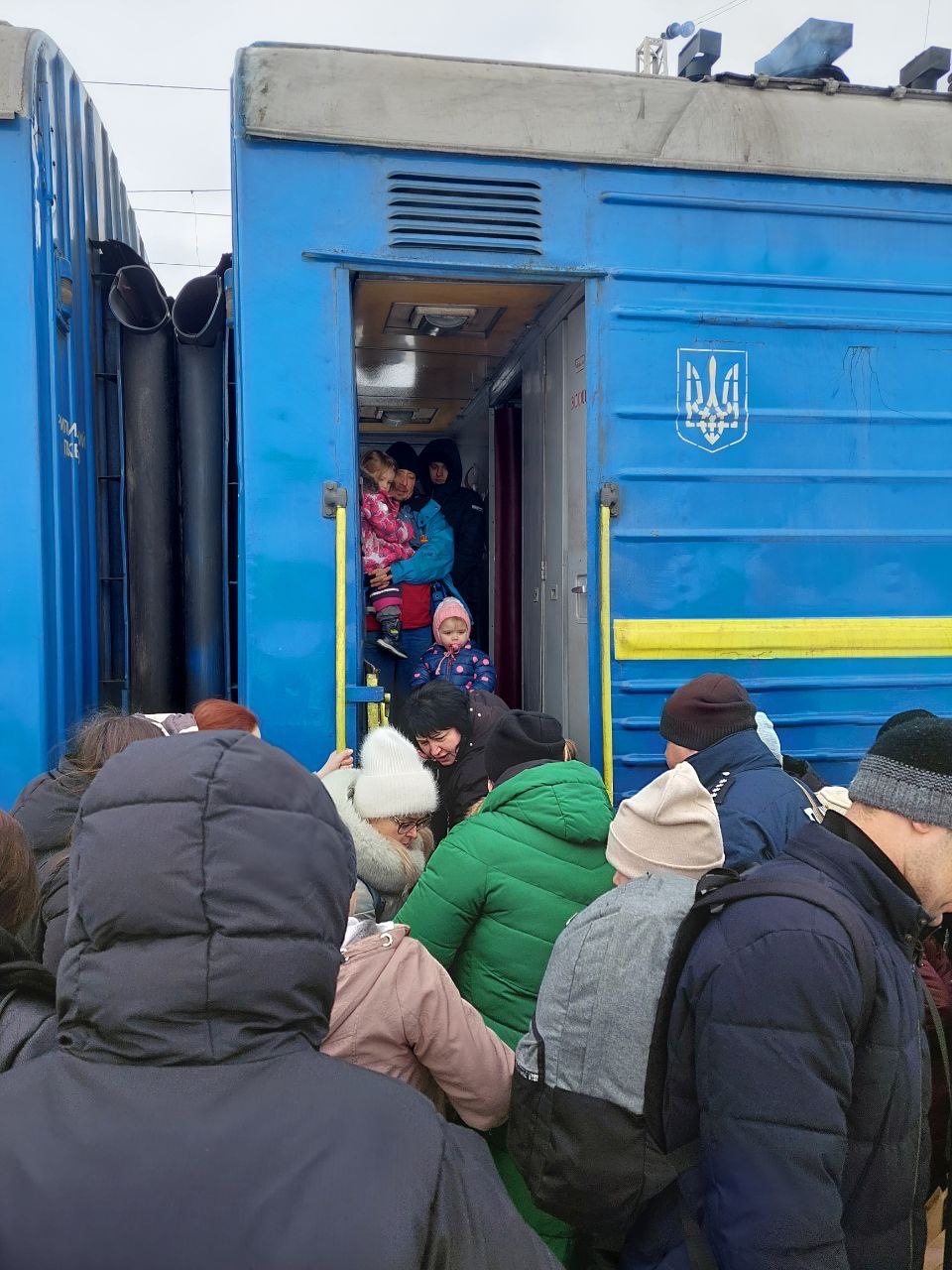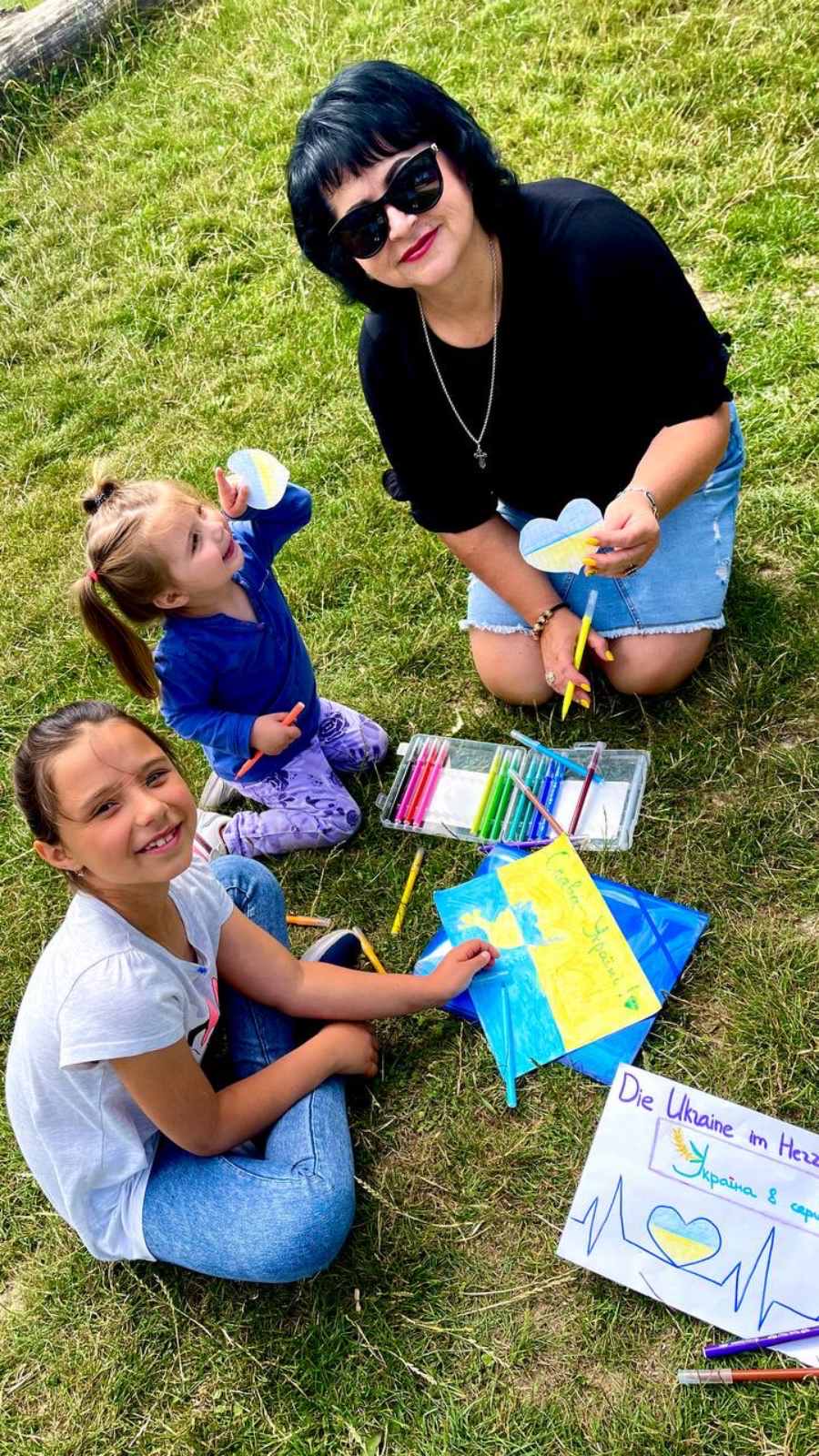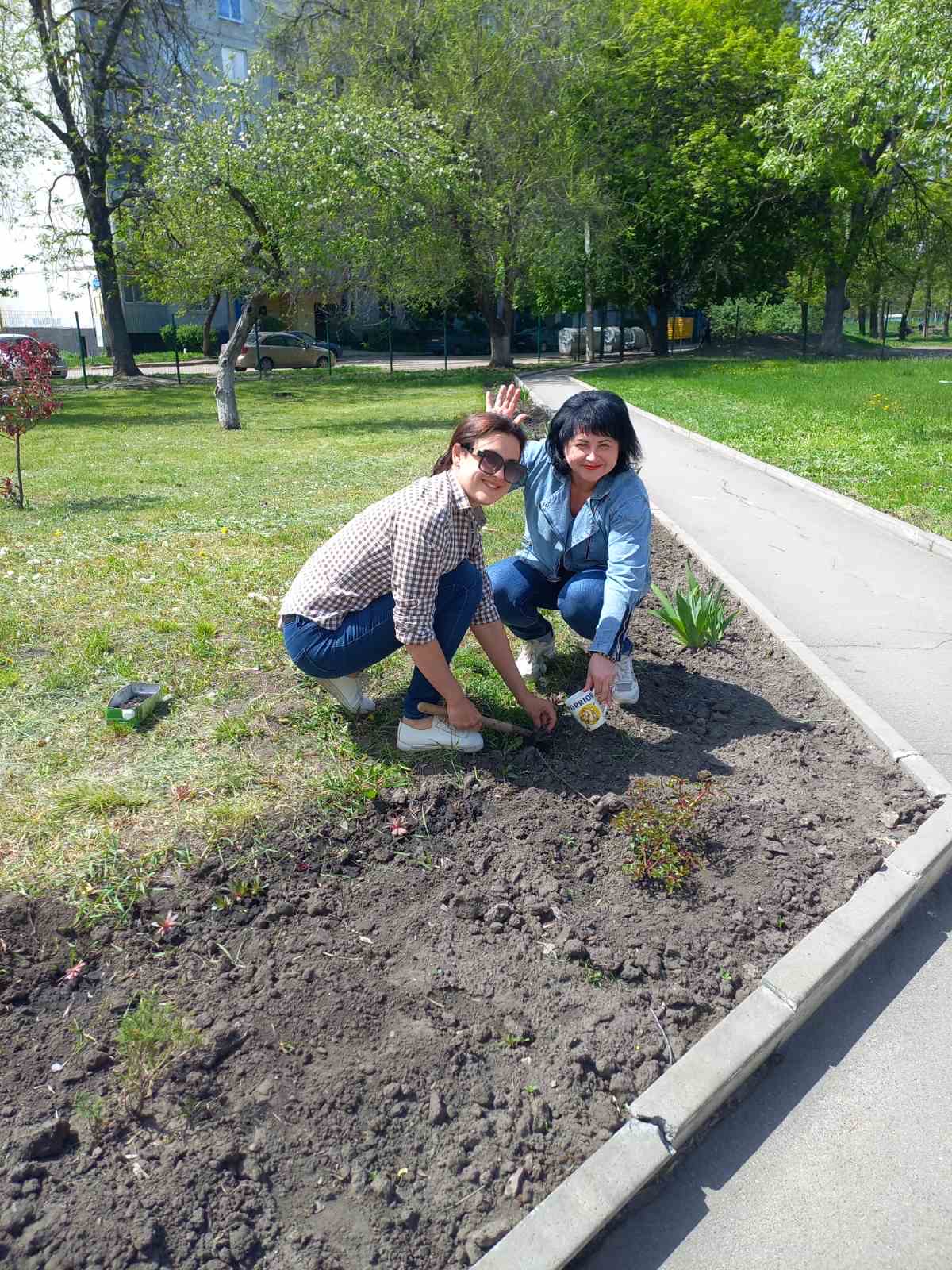Interview 22. Healing emotional wounds. Olena Zolotoverkha
Kharkiv School No.26 has not stopped working since the beginning of the war. Despite constant shelling and evacuation of the inhabitants, the teachers continued to work — they communicated with each other and the children in order to provide support and avoid depression. According to school director and history teacher Olena Zolotoverkha, there are different ways to learn resilience and heal emotional wounds – through growing plants and editing videos with children, through conversations where people have the opportunity to express themselves, and also through historical parallels that the students can trace in their own lives.
A difficult decision
On the eleventh day of the war, I decided to evacuate my two-year-old granddaughter. I was taking care of her because her parents were abroad at the time. The child needed her mother, so it was necessary for her to leave. But she is a good girl, a hero, and I told her so. It was tough, but she endured it all, because she wanted to see her mother. We reached Warsaw, where my daughter met us. The older granddaughter was in Germany, and we went to see her. Then, I decided to return to Kharkiv. This was very difficult for me, because my family did not want me to go back; they were afraid that they would not see me again. But, there are people who were waiting for me in Kharkiv, people whom I inspire and whom I can advise; it is easier for them when they see me at the school.
Damaged by war
My school is my life. According to statistics, up to 85% of our teachers have left. For those who stayed, the school has become a shelter. I cannot say that it is in a safe zone: missiles struck our area several times. But, the school has a small basement. It is safer for people living on the top floors to be on the first floor and in the basement. It really doesn’t matter if you have left your home or stayed or what your living conditions are; we are all damaged by this war, not only physically but also mentally. This is probably the main problem. When you see the corpses of our enemies, you experience emotions that you would never have dreamed of feeling. I really want us to remain human. It is very difficult.
When the teachers hear artillery fire and shelling in the neighborhood all day, they usually stay home. On quieter days, we work at the school. In the spring, we planted trees and roses in the schoolyard. This is how we try to make our life look beautiful, and we really desire victory and peace. It will take a long time to heal the emotional wounds. This is the most important challenge for all of us. Those who have gone abroad are supposedly safe because they are under constant shelling. But, they have no home, kindergarten, or school; relatives may also be far away. It often happens that the mother and children leave, while the older parents or husband and adult son stay home. Everyone must make a difficult choice.


I decided to return to Kharkiv. This was very difficult for me, because my family did not want me to go back; they were afraid that they would not see me again.

Ukrainian stars make a choice
Our celebrities make me proud. Taras Topolia, Fahot, Sviatoslav Vakarchuk… they are loved and admired in Ukraine; these stars are used to applause and concerts. But now, they serve in the Territorial Defense Forces, work as volunteers, or travel to frontline regions to support our soldiers, often visiting dangerous places. They are worthy of our respect and admiration. I am also very proud of our president and support everything he does.
Meeting together for mutual support
In our school, the educational process did not stop for long. We made this decision because we needed each other’s support. We did not conduct lessons or violate the law, but we made a flexible communication schedule. The teachers also talked a lot together and with the children.
It was not easy. We were confused, depressed, and in need of support. People from my group wrote to me that communicating was impossible because most of the children were sitting in basements. In response, I cited the example of Kharkiv’s communal workers: something was constantly breaking down, but they proceeded to repair damaged structures even under artillery fire. We all got in touch, made a roll call among the students – and started communicating. Initially, 5-8 children were at the meetings, but in March, one of my colleagues already had 21 students.
Therefore, it was easy for us to organize the lessons when the educational process officially began. Of course, there were problems, because the children and teachers are scattered all over the country and abroad. When they left Ukraine, they took only their phones with them and so had technical difficulties getting online. But, we got over it.
Educational Front
In Kharkiv Region, they plan to start the new academic year on September 1, but most students will follow courses online. According to Oleh Syniehubov, the head of the Kharkiv Regional Military Administration, children will study online in the temporarily occupied territories of the region, where there are 165 schools, and in educational institutions located closer than 40 km to the active war zones. Offline education will be considered only in some localities, where there is an appropriate security situation.
In order to help Ukrainian educators to continue teaching children during the war, the EdCamp Ukraine community launched a crowdfunding campaign — collecting funds for computer equipment and Internet access for teachers who lost their pedagogical equipment in the war. The funds will be used for psychological support for teachers and to organize conferences where they can share their pedagogical experiences during the war. Both foreign colleagues – on the GoFundMe platform, and Ukrainians – on the EdCamp Ukraine page, can join the campaign by adding the comment My War. Lessons to the payment.
What Ukraine means for us
During the first months of the war, my students and I created six educational videos – for Easter, about distance learning, greetings for Environment Day, and a presentation of personal drawings – What Ukraine means for us. The video was shot in different ways. One child filmed abroad, the other in the basement. The content turns out to be very different, but it is not the technical quality but the substantive quality that is important. There are a lot of willing children; I am very grateful that they respond to these initiatives. One boy made a video of him planting something and singing Oi u luzi chervona kalyna (Oh, the red kalyna in the meadow), and then these seedlings begin to sprout. Such videos are important to me. We made videos before the war, so why not do it now? They inspire the audience and we can maintain our skills at a consistently high level. Thanks to these videos, we do not lose the connection between pre-war and present-day life.
Changes for the better
I teach history in the 10th grade. When the topic of the Second World War was discussed, to be honest, I did not understand how I should approach it against the background of our war. As it turned out, it was easy because I didn’t have to explain much about who Stepan Bandera was or what denazification meant. Children already know all this from what is happening around them. Therefore, I draw parallels, thanks to which we can both teach and educate the children.
We work with Zoom, and I use the allotted time to see and listen to the students. I ask short questions so that everyone can express themselves. I pay attention to my appearance. When the children see their teacher and principal at the workplace, everything proceeds as it should.
Of course, my colleagues and I took into account the recommendations of the psychological community – we did not overload the children or give them homework. Instead, I suggested that if the children have the opportunity, they can complete one task. But, our children have become more responsible and independent. When I gave tasks at nine in the morning, I received the completed work in my e-mail at 13-15.00 in the afternoon. Our children want to learn; they strive to understand. They have changed for the better, and that is very good.
The main lesson
I am proud of Ukrainians as a nation because we have demonstrated dignity. This means that in 30 years of independence, our educational community has fulfilled its task. The law on education states that the school should educate citizens, patriots, and generally decent people. If we manifest such feelings today, I believe that our teachers have probably fulfilled their main task. And we did it in a state of constant change and devaluation of our teachers’ work. But, our unity is the main result. Therefore, I am sure that we, as educators, should continue cultivating three critical competencies — patriotism, decency, and professionalism, without which it is impossible to build a flourishing state.
Online opportunities
Experience shows that teachers, who correctly organized distance learning before the coronavirus pandemic, were able to continue teaching in wartime. I would urge both foreign and Ukrainian educators to work on distance learning, and the opportunities provided by Zoom and other platforms. Because I, for example, do not use Zoom 100%, but I know in which direction to move. We face a lot of challenges – first, the pandemic, and now war, both of which have greatly affected our lives. Therefore, remote technologies will be relevant for a long time.
Building resilience into the education system
We really wanted to hold an EdCamp in Kharkiv in May, but the war made it quite impossible. However, the topic we chose remains relevant. Our topic – Upgrading innovation in education – was supposed to introduce a frank, tolerant, and independent dialogue about forming a harmonious personality. The focus was supposed to be on emotional and physical resilience, and spiritual development. My creative team and I believe that all of these things remain very relevant. Because without resilience, it is impossible to overcome the challenges of war. Therefore, we should upgrade the resilience of educational institution during the war. We would like to invite experts from the pedagogical community and from the medical and cultural spheres.
It is also necessary to talk about educating students in patriotism; without this element, Ukraine would not exist now.
Text — Halyna Kovalchuk.
The interview series My War. Lessons was prepared with financial support from the Black Sea Trust for Regional Cooperation – a project of the German Marshall Fund of the United States
The views and opinions expressed are those of the author and do not necessarily reflect the official policy or position of Ed Camp Ukraine and the Foundation.












